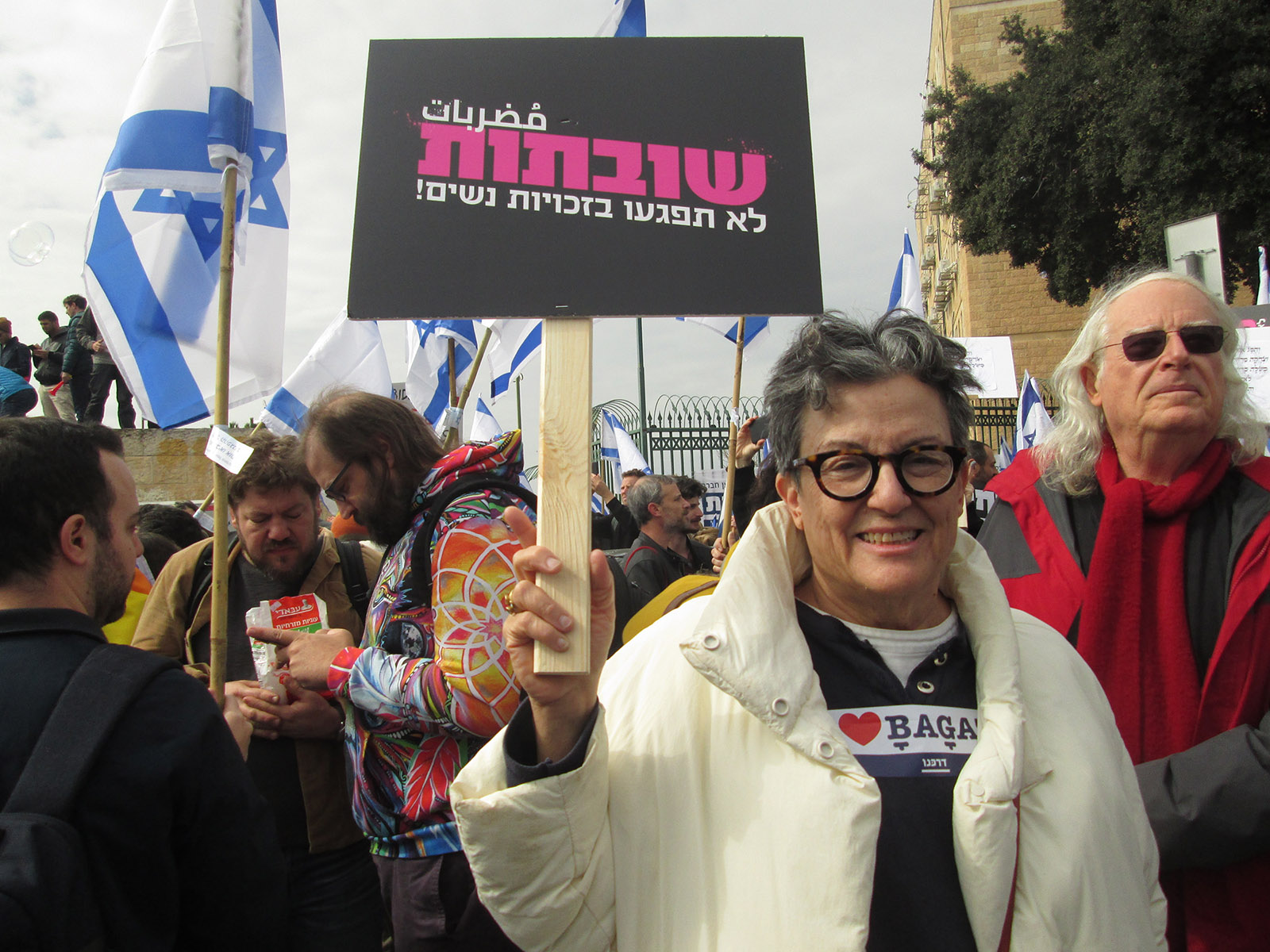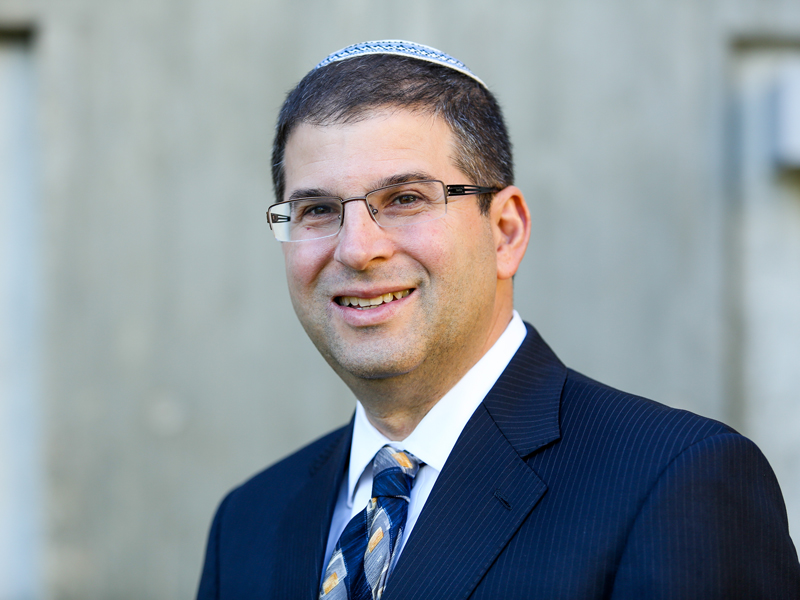JERUSALEM (RNS) — Susan Weiss, an Israeli activist, worries that proposed judicial reform that would grant Israeli lawmakers the right to overrule the country’s Supreme Court would greatly broaden the reach of Israel’s Orthodox Jewish establishment.
“We think the state should not be in charge of religion. The state should not pick and choose which expression of Judaism they think is authentic,” said Weiss, one of an estimated 300,000 Israelis who flooded the streets outside the country’s High Court on Monday (Feb. 13) to protest the proposed bills.
If successful, the proposed reform would allow a slim majority of lawmakers — just 61 of 120 in the Knesset — to reverse High Court decisions. It would also give parliamentarians the final say on who can serve as a judge.
Weiss and many others fear that the proposed judicial overhaul would allow the religious parties that make up a crucial swing vote in Israel’s Knesset, or parliament, to impose fervently religious norms on Israel’s non-Orthodox majority.
“I’m here for my grandchildren. I want them to live in a country that’s democratic and protects the civil liberties of all its citizens,” said Weiss, whose organization has argued cases on behalf of women’s rights before the High Court.
Supporters of the reforms consider them a necessary step to “rein in” the judiciary, according to the Israel Democracy Institute. Over the decades, the court has repeatedly challenged the authority of Israel’s religious institutions in favor of religious pluralism.
Critics of the reforms “fear that the removal of the only effective check on executive power in Israel will jeopardize civil liberties, economic prosperity, and Israel’s international standing,” the institute said.

Susan Weiss, executive director of the Center for Women’s Justice, protests in Jerusalem on Feb. 13, 2023, against proposed judicial reforms in Israel because she fears that they will weaken the courts and strengthen the reach of the Orthodox Jewish religious establishment. Photo by Michele Chabin
Uri Regev, CEO of Hiddush: Freedom of Religion for Israel, believes religion-state issues will take center stage when it comes to legal challenges.
The reason: Nearly half of the governing coalition’s 64 lawmakers belong to Orthodox or ultra-Orthodox political parties. They joined Benjamin Netanyahu’s new government on promises of sweeping judicial reform that would favor Orthodox causes.
“The Orthodox Knesset members will focus on blocking the conscription of yeshiva students, defining who is a Jew, increase budgets to religious institutions, strike down the core curriculum and work against gender equality,” predicted Regev, a lawyer and Reform rabbi.
The religious Knesset members want yeshiva students to remain exempt from mandatory military service and have vowed to make it more difficult for non-Jews of Jewish ancestry to immigrate to Israel under the Law of Return. They say ultra-Orthodox schools should not have to teach “core” secular subjects like math, English and civics to be eligible for state funding.
Recently, an Orthodox Knesset member introduced legislation that would punish non-Orthodox behavior at the Western Wall. It would impose a 10,000 shekel (nearly $3,000) fine or six months’ imprisonment for anyone indulging in mixed male-female prayer, wearing “immodest” clothing or holding ceremonies that violate the “customs” of the holy site — including women who read from a Torah scroll, blow a shofar or don a prayer shawl or phylacteries.
Last week, in a protest against the bill, a woman entered the women’s section of the Western Wall, removed her raincoat and stood in her underwear, garnering headlines around the world.
The lawmaker’s bill, which is clearly intended to prevent non-Orthodox Jews and women’s prayer groups like Women of the Wall from praying at the Wall, was frozen after an international outcry. “But what’s to stop it from being introduced again?” said Rachel Stomel, English communications director for the Center for Women’s Justice, who stood with Weiss at the democracy rally.
Seth Farber, an Orthodox rabbi whose nongovernmental organization ITIM has won several High Court cases against the religious authorities, said he “understands those who seek modest dress for all at the Wall,” but he called attempts to legally define the “right” type of Judaism “inexcusable.”

Rabbi Seth Farber. Photo courtesy of ITIM
“Rather than promoting a Judaism that is coercive,” Farber said, the rabbinate and the Knesset “should be encouraging people to connect to their Jewish tradition — embracing them rather than alienating them.”
Farber, whose organization has performed about 2,000 government-recognized conversions to Orthodox Judaism, worries the Knesset will strike down the High Court ruling that abolished the rabbinate’s monopoly on certifying conversions to Judaism. The rabbinate controls who can marry in Israel.
Such a law “could affect thousands and thousands of people,” many of them immigrants, he said.
Another bill on the Knesset docket could widen the authority of the state’s rabbinic court system into civil courts’ jurisdiction.
Given that all rabbinic court judges are male, Orthodox and have sworn to uphold Jewish law, empowering them to decide financial arrangements and who gets custody of the children in a divorce would put women at a disadvantage, women’s rights advocates warn.
Besides the practical implications, Shlomit Ravitsky Tur-Paz, director of the Shared Society Center at the Israel Democracy Institute, worries that the proposed reforms could widen a contentious rift between Orthodox and non-Orthodox Jews in Israeli society.
Many non-Orthodox Israelis already feel this isn’t their country, Tur-Paz said. “They see religious lawmakers who want yeshiva students to earn more money than soldiers. They’re asking, do we still have a common story? Are we still the same people? Do we still live by the same rules?”
Speaking as an Orthodox Jew, Tur-Paz said, “It’s not about Israel becoming more Jewish and less democratic. It’s about one group of Jews telling other Jews ‘you aren’t part of our people.’
“If we say that being Jewish is being Orthodox, that you can’t be Jewish and have gender values, or care about the environment, where does it leave the vast majority of Jews who are traditional but not Orthodox? If I go to pray the Western Wall in short sleeves and trousers, will the Western Wall still be mine?”





